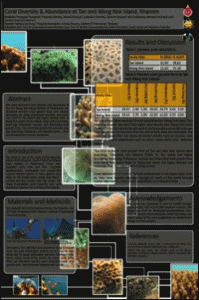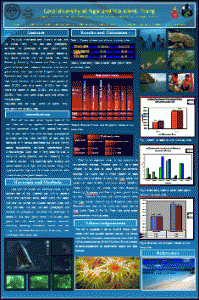This week our blog is from Dr. Krisanadej Jaroensutasinee and Dr. Mullica Jaroensutasinee from the Centre of Excellence for Ecoinformatics at Walailak University in Thailand. The research they are presenting in this blog is also done with Sirilak Chumkiew, Premrudee Noonsang and Uthai Kuhapong, also from the Centre of Excellence for Ecoinformatics at Walailak University and Dr. Elena Sparrow with the International Arctic Research Center at the University of Alaska, Fairbanks.
Climate change and increases in sea surface temperature (SSTs) are projected to be very likely in the coming decades. Combined with the acidifying effect of increasing dissolved carbon dioxide in the ocean, there is a clear research need to understand the likely impacts of climate change on marine ecosystems.
Coral reef ecosystems are sensitive to climate changes in the physical environment. Coral bleaching caused by unusually high sea temperature has had devastating and widespread effects worldwide. Numerous physical factors reduce the incidence of coral bleaching such as low light, high flow, lower temperature and higher nutrients. The link between physical conditions and the biological responses that lead to coral bleaching allows for the prediction of when corals may bleach based on measurements of the in-situ physical parameters. Monitoring of these parameters therefore becomes an important part of understanding and responding to coral bleaching events.
GLOBE Thailand, led by Dr. Pornpun Waithayangkoon (Thailand GLOBE country coordinator and IPST President), strongly supports the Thai Coral Project. GLOBE Thailand funds five GLOBE coral student research projects per year since 2009. Dr. Krisanadej Jaroensutasinee and Dr. Mullica Jaroensutasinee are the main scientists. Thai students will be using coral protocols, as well as some GLOBE hydrology protocols and atmosphere protocols, during their research investigation. Thai students have a chance to share their findings with SCUBAnauts International, led by Dr. Elizabeth Moses.
 (b) (b) |
|
|
|
Figure 2. Coral Database System and data visualization. (a) Coral database Homepage, (b) sea surface temperature data (SST), (c) SST and salinity, and (d) ecocam.
We developed Thailand coral protocol and the Coral Database System (CDS). The CDS provides an essential tool for querying, analyzing and visualizing patterns of coral data in Thailand. The CDS prototype is available online. There were five study sites: (1) Racha Islands, (2) Phi Phi Island, (3) Hinpae and Ngamnoi Island, (4) Tan Island and (5) Sinmana farm. Each site contained different sensor data. Coral Database System was comprised of four types of sensor data: CTD, HOBO Pendant, weather Data, and ecocam. Users can visualize data and ecocam by selecting study sites and sensor types, time data collected and then visualizing the data. This database was designed to assist students and researchers who interested in long term monitoring of coral sensor data.
 |
 |
Figure 3. Examples of coral project student posters presented at the GLOBE Learning Expedition.
Suggested Activity: Do you have coral reefs in your area? Have you done any research connecting atmospheric and hydrological variables to coral ecosystem? Send us an email at science@globe.gov or add a comment to let us know about your research!



 (a)
(a)
 (b)
(b)
One of the most important threats facing coral reefs on a global scale is a big one: climate change. Scientists agree that climate change is real, and this spells real trouble for the world’s coral reefs.
Global ocean temperature has risen by 1.3°F since the late 19th century and is continuing to climb. Rising (or even falling) water temperatures can stress coral polyps, causing them to lose algae (or zooxanthellae) that live in the polpys’ tissues. This results in “coral bleaching,” so called because the algae give coral their color and when the algae “jump ship,” the coral turns completely white. The algae also give coral polyps the food they need to survive. While a bleached coral is not dead, and corals can survive bleaching events, they are under greater stress, are less resistant to other threats such as disease, and are thus subject to mortality.
Increased carbon dioxide in the atmosphere is one of the recognized causes of our changing climate and it is also problematic for coral reefs. The ocean absorbs approximately one-third of the atmosphere’s excess carbon dioxide, resulting in a more acidic ocean. In order for a coral reef to grow, it must produce limestone (or calcium carbonate) at a rate that is faster than the reef is being eroded. Ocean acidification slows the rate at which coral reefs generate calcium carbonate, thus slowing the growth of coral skeletons.
Climate change can cause sea level rise; changes in the frequency, intensity, and distribution of tropical storms; and altered ocean circulation. All of these impacts can have negative consequences for the health and diversity of reefs around the world, including in the Florida Keys.
Looking at the so called Summer we have this year (and we had in the past couple of years) in North-East England I would imagine our climate tendst to get exactly opposite the trends in global climate. I wonder what impact will it have on our coastline.
I have to completely agree with Rzydowski, in last couple of years we have observed record low average monthly and quaterly temperatures in the UK, it’s now official that the spring 2013 has been the coldest in over 50 years!
Whether this will continue to be unexpectedly cold or not, it’s worth of noticing that extended heating season will definitely have some bad impact on the natural environment.
Scientists agree that climate change is real, and this spells real trouble for the world’s coral reefs.
The global ocean temperature has risen by 1.3°F since the late 19th century and is continuing to climb.
I did a research paper on coral reef bleaching in college (studying biology) and that was at least 14 years ago. How has the bleaching progressed? Has it gotten progressively worse? And is it worse in certain areas of the world more than others? I agree climate change is real and wonder how much longer do we expect for the coral reefs to hold off?
I feel in love with coral as a child snorkeling. When I returned years later as an adult it was sad to see how the reefs had declined over the years. As a reef enthusiast I know first hand just how delicate live coral is, and even minor changes in our climate is going to drastically effect our or reefs forever.